UNIT1 :AGRIBUSINESS AND SOCIO-ECONOMIC DEVELOPMENT

Key Unit Competence: To be able to develop agri-business activities
and know their contribution towards socio-economic development.
Introductory activity
Case study
Mahoro is a Teacher training college graduate and an orphan.
After her parents died in 2005, she continued with the agricultural
work that her parents used to do turning it into family business.
Mahoro had to assume all the responsibilities looking after her 3
siblings/brothers and sisters.
She started from one cow, a small farmland using her knowledge
in entrepreneurship obtained in TTC, and O’level sought advice
from her immediate relatives. Her relatives advises her to apply
for a loan in Umurenge Sacco and luckily she was granted a loan
after presenting a good business plan, she had in mind expanding
and while having a dream of being self-employed.
Some of her friends discouraged her by advising her to apply
for the job and go to teach but she kept deaf ear, at first,
she invested almost half of the loan in growing sorghum
but the season wasn’t favorable and the scorching sun destroyed everything.
Mahoro didn’t give up the next season she changed to Irish potatoes
and she harvested over 10 tones; since then Mahoro has been able to buy
a commercial house in the trading centre, pays taxes to the government
and looks after her siblings and they are all university graduates.
Mahoro has secured a contract from Nakumatt to supply vegetablesand she has a plan to start processing her output to be able to conquer international market.
Questions
a. Identify ways in which Mahoro’s farming activity is different
from other farmers as usually done in your locality.
b. What motivated Mahoro to undertake the above activities?
c. Suggest the contribution of agribusiness to the economic development of the country
d. In which situation can the government assist the youth to benefit morefrom agribusiness activities?
1.1. Meaning of agri-business, Socio-economic development, and agri-business activities
Activity 1.1
1. Explain the meaning of agri-business
2. Using your knowledge acquired in O’ Level, explain the concept of socio-economic development.
1.1.1. Meaning of agri-business, Socio-economic development
The term “agri-business” is delivered from two words namely agri
(which means agriculture) and business. Agriculture;
is the art of cultivating and growing the plants and livestock
for the survival of an individual or a family. After a long time people
doing agriculture just for their survival only, they experienced a lack
of monetary income and they started thinking of how they can producemore for selling purposes hence Agribusiness.
Agribusiness therefore is a combination of agriculture and business.
It is defined as an activity of growing plants, live stocks,…
for commercial purposes. This may include the dealing in agrichemicals,
breeding, crop production, distribution, farm machinery, processing,and seed supply, as well as marketing and retail sales.
Eventually, Agribusiness involves in the production and selling
of agricultural products to earn a profit. The size of agribusinessesdiffers from micro businesses to large businesses.
Example of some activities that an entrepreneur can do in agribusiness
1. Tree nursery. A tree nursery can be a great investment
when done in right way
2. Fish farming. Fish farming is an ideal business idea
for investors with available land, and it does not always require a body of water.
3. Dual crop farming.
4. Dairy farming.5. Herb gardening.
6. Bee farming.
7. Aquaponics....
8. Micro greens farming.
9. Urban agriculture. You don’t need a huge space to get into the agriculture business
10. Vegetable farming
11. Livestock feed
12. Fruit growing
1.1.2. Socio-economic development
This is a multi-dimensional process of transformation involving
accumulated qualitative and quantitative changes in an economy
leading to better standards of living. Social economic development
involves cultural changes, social changes, economic transformation,
education reforms and it is a continuous process covering a long period of time.
Socio-economic development involves economic growth which
should eventually lead to changes in peoples way of life, attitude,
fairer distribution of the country’s wealth and provision of essential needs like food,
shelter, clothing, higher standards of living, changes in occupational structure
towards self-reliance and radical changes in political institutions
and administrative structure with the aim of giving greater opportunities
to the masses in the decision making.
Agribusiness is one of the drivers of socio-economic development in developing
countries and it is on this note that it should be embraced and taken advantage
of by government institutions concerned to ensure that optimum out through
support and sensitization of the youth.
Agribusiness has an impact on practically all the Sustainable Development Goals (SDGs).
According to the Food Agriculture Organization of United Nations (FAO),
over 70 per cent of the world’s food needs are met by small farmers.
Agriculture is the economic sector that employs most people in the world,
and the main source of food and income for many people living in poverty.
Thus, investing in agriculture is not only one of the most effective strategies
to improve food security and promote sustainability but it is also essentialto many countries’ economic development.
Practicing agribusiness in Rwanda requires serious analysis.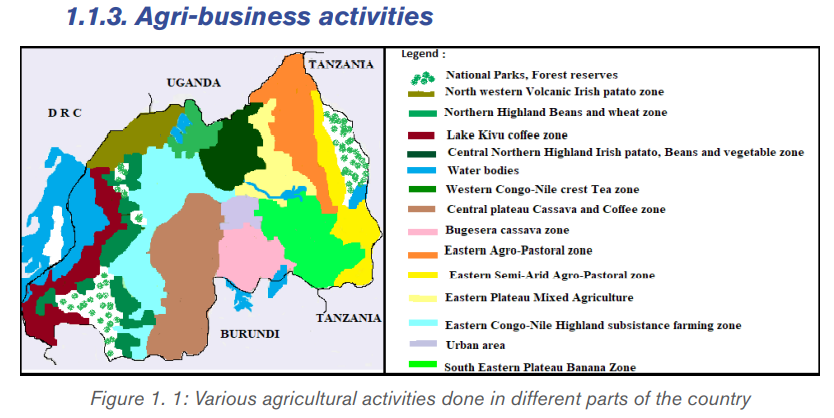
As you observe the map above, different agricultural activities
are conducted in various areas; one needs to scan the environment before investing.
There are some crops that are grown here but that cannot survive there…
(e.g.: Arish Potatoes are grown better in North than in south).
Therefore, entrepreneurs should recognize that not every
agribusiness venture is viable everywhere unless
if you avail some of the key climatic conditions to that surface
(E.g.: irrigation practiced in dry areas) though the type of soil will also mater.
Another point to note is that, though most people believe that agribusiness
is best done on extended/ wider surfaces, people should be aware that even
on a single square meter (1m2 ) one can do agribusiness for instancemushrooms, Legumes, various vegetables, …… and as well, poultry does not require big surfaces.
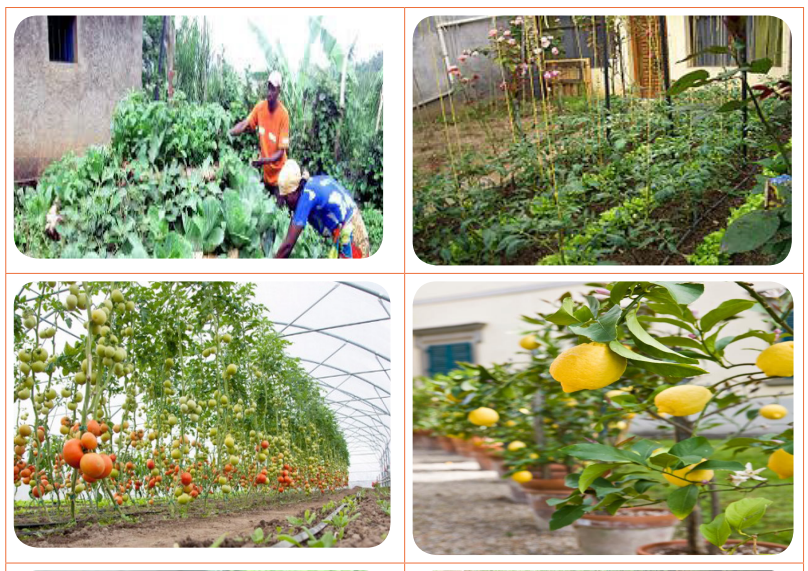
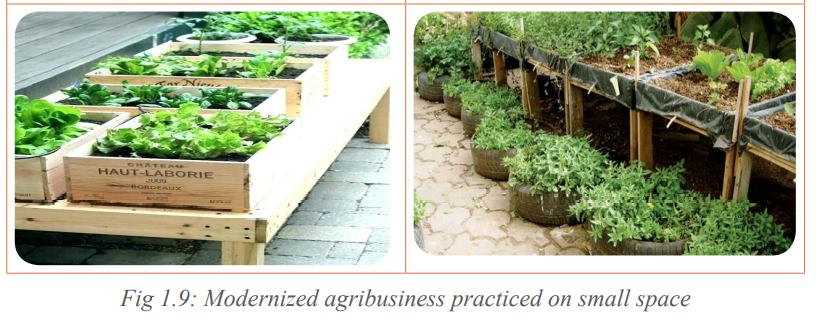
As entrepreneurship student teachers, you have to be very inquisitive and think out of the box.
a. Livestock/ Animal rearing
This type of agri-business involves in the rearing and selling of different types
of animals for beef, milk and hides and other products. Animals commonly kept include:cattle, sheep, goats, hens, pigs and camels

b. Crop production
In this type of production crops are produced and sold, they include;coffee, tea, cassava, bananas, cotton, maize, beans, potatoes, tobacco etc.
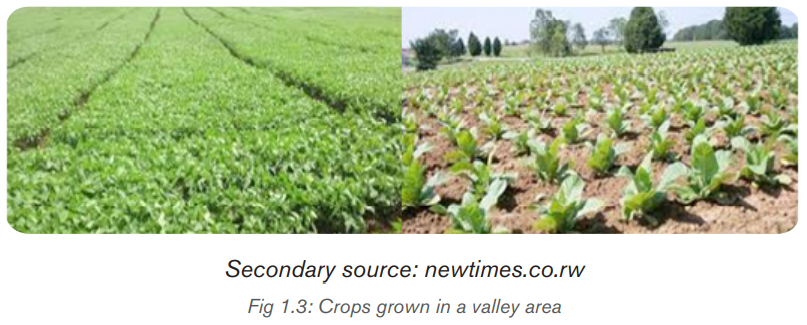
c. Poultry keeping:
An entrepreneur in this type of agribusiness concentrates
on the keeping and selling of birds for meat, eggs, feathers and skins.The types of bird commonly kept in Rwanda include: chicken, ducks, turkeys, Guinee fowls etc.
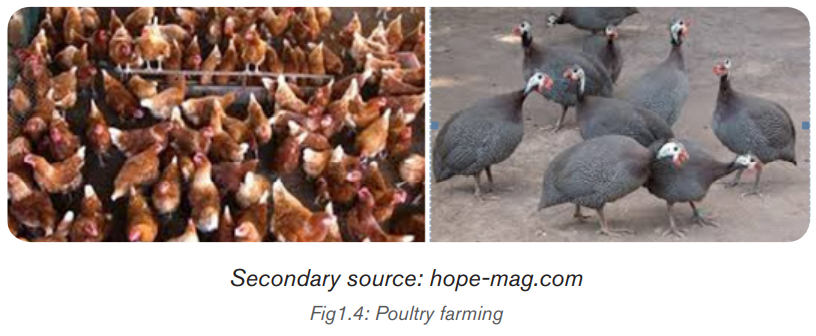
d. Floriculture.
Entrepreneurs in this type of agribusiness grow and sell flowers
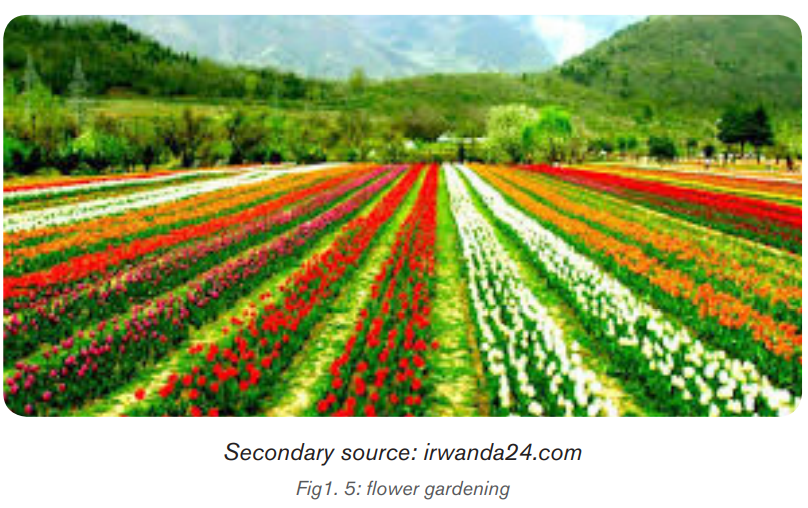
e. Aquaculture.
In this type of agribusiness, entrepreneurs deal in fish farming, crocodile farming etc.
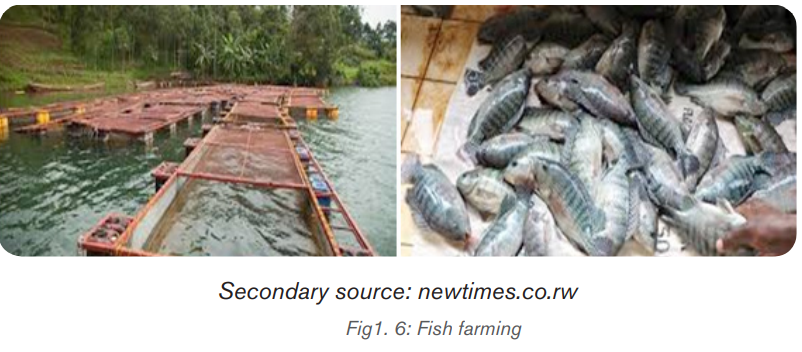
f. Horti-culture:
Entrepreneurs dealing in this business, grow fruits and vegetables.
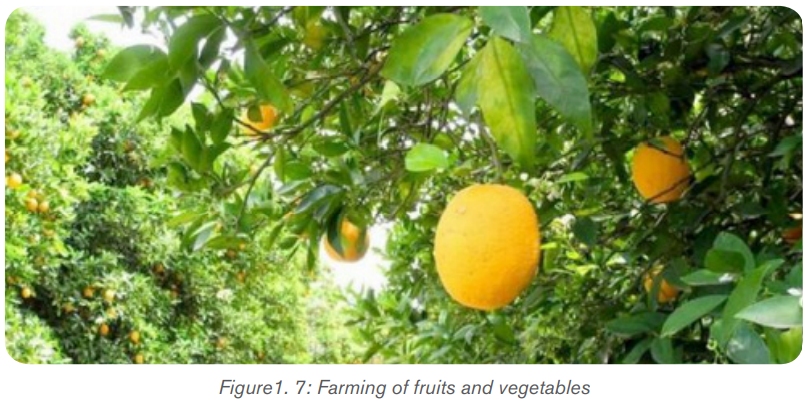
g. Apiculture:
Entrepreneurs in this business involve in bee keeping for honey.

Application activity 1.1
Study the photos below and answer the question thereafter

Question:
1. Describe agri-business activities illustrated in the photos above.
2. Conduct a research on agri-business activities providedin the photo above, analyze them and come up with the ones that suit your school locality.
1.2 Contribution of agribusiness towards socio-economic development
Activity 1.2
In your own understanding, explain different benefits people in your community
have enjoyed/benefited or gained from agribusiness activities.
Agriculture is crucial for Rwanda’s growth and reduction of poverty,
as the backbone of the economy,
it accounts for 39 percent of gross domestic product (GDP),
80 percent of employment,
63 percent of foreign exchange earnings, and 90 percent
of the country’s food needs.
The following are some of the contributions of agribusiness
to the economic development of the country:
• These businesses provide food for the community
and people are able to survive on food produced.
• They provide employment chances to the people in the community
and this helps to reduce on unemployment in Rwanda. Agribusiness employs
the biggest percentage of people
• Provide raw materials/inputs to other industries in the country
for instance wheat providers supply inputs to Azam industries to produce
wheat flour etc.
• They act as sources of income to the population.
People get money which they use to buy essential goods thereby increasing
on their standards of living.
• They use bi-products like rubbish, husks etc.
which would have otherwise been dangerous to the environment
there by conserving it from damage.
• Provide foreign exchange through the sale of goods on foreign markets
• Provide market to other industrial products e.g. fertilizers, farm tools
• Act as a source of income to the government in form of taxes
• Some areas are developed because of agricultural activities
and products from such areas e.g. roads are developed.
However, though agribusiness has a lot of contributions,
we should bear in mind that people who practice it meet with/face so many challenges.Therefore, here are some of the challenges faced and the possible solutions:
Challenges faced in Agribusiness and possible solutions:
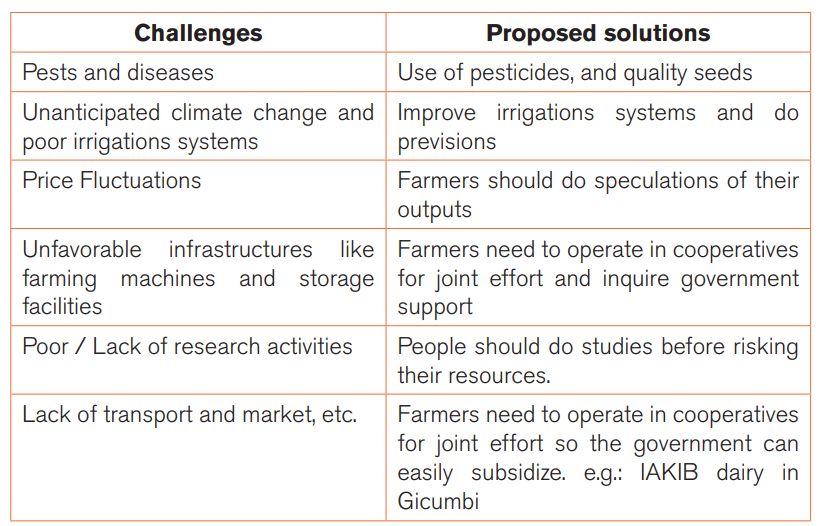
Application activity 1.2
1. Think about any 3 agri-business activities in your school locality, and discuss theircontribution towards socio-economic development of Rwanda.
1.3 Youth employment in agri-business
Activity 1.3
With clear examples, explain the meaning of youth employment.
1.3.1. Meaning of youth employment
There is no legal reference to define the term “youth”. Individuals are either under aged,
entirely dependent or adults and thoroughly responsible for what they do.
According to the criteria on recognized by the United Nations, the youth
comprises of people that are between 15 and 19 years old (adolescents)and those who are aged between 20 and 24 (young adults).
Youth meaning varies from one society to another and has evolved depending
on political, economic and socio-cultural contexts. In that case, a young person
is that person who is considered as such by the society”. In Rwanda, the youth ismade up of persons aged between 14 and 35.
Youth employment is the situation of young people who are looking for jobs,are able to find jobs, with the age range being that defined by the United Nations as 15–24 years old.
Note. Given that a third of Rwandans, about 3.7 million individuals are aged 15 to 34,and youth employment is a critical policy issue.
In Rwanda, the land is the main factor of production and is, as a result,
due to the fact that plots are becoming smaller and smaller.
The land is too small to be rationally used by the population that still
employs anachronistic techniques that we know. This is the reason why
the promotion of youth employment should also target non-agricultural
activities both in rural an urban areas such as rural production oriented,
sewing, leather works, cycle repairing, construction, carpentry, electricity,
bricks production, sports equipment production, cyber café, electronicworkshop and activities that require greater labor force (Haute Intensité de Main d’Oeuvre/ HIMO),
A good entrepreneur who invests in area of agriculture should have in mind that,
Rwanda is in situation that 42 % of the youth aged between 14 and 35 are either
unemployed or only work on seasonal small scale agriculture. Excessive needs
in terms of land find expression in that on family owns less than one hector for
its agricultural activities, which is the line below which one cannot meet their
nutritional basic needs. To invest in agribusiness, there is a need to think big
to bring new technologies in agriculture or to think the way of modernizing
the agriculture or practice agriculture on small space, for example greenhousefarming, market gardening, small space gardening ,etc.
1.3.2. Benefits of youth employment
With youth underemployment rates the highest they have been in 40 years
it is more important now than ever to embrace and explore the benefits thatyoung people bring
• New energy and perspective: Young employees can bring fresh perspective
and a different way of thinking to your business. Most young workers are eager
to learn, build their experience and apply their skills in the workforce.
This enthusiasm is great for team building, productivity and workplace moral.
Younger employees will also give you an advantage if you want to targetthe millennial market as they understand how to reach and communicate with their peers.
• Workforce development: Young people are used for learning. If they have just come out
of school or tertiary education, they will still retain a mindset that will help them absorb
training more readily. As they don’t have a huge amount of previous experience young
people are essentially a ‘blank slate.’ This affords/gives their employer an opportunityto develop a workforce of young people specifically trained to meet their organization’s needs.
• Affordability: More often than not, wages for a young employee are less expensive
than those for an older more experienced worker. There are also options for formaltrainee and apprenticeships which can be of great benefit to both employers and young people.
• Technology advancement & early adoption: Millennial have grown up around technology.
Their natural affinity for tech and their ability to apply and understand different
technologies quickly sets them apart from other generations in the workforce.
Hiring young people has a positive and important impact in driving business forwardin the adoption and use of new software and technology
• Adaptability & agility: When unexpected circumstances arise, younger
people are better equipped to respond to sudden change, this can be of great
benefit in the shifting landscape of the modern-day workplaces where process,
technology and priorities are constantly changing. With economic,
social and political boundaries in a state of flux, adaptability gives young
people an advantage in a work environment that is more agile, changeableand fast paced than ever before.
• Youth employment builds young people’s self-esteem and self-confidence;
• It develops ability of the youth to manage personal and social relationships;
• Offering worthwhile and challenging new experiences at work and outside work place;
• It provides learning opportunities to enable young people to gain knowledge and develop
new skills;
• Building young people’s capacity to consider risks and consequences and make informeddecisions and take responsibility
• Helps young people to develop social awareness and a sense of social solidarity form
their work environments.
• It gives young people a voice in decision-making which affect their lives;
• Enhances young people’s role as active citizens and preserving culture.
• When young people are employed, the crime rate is reduced, idle resourcesare exploited and generally the living standard is improved.
Application activity 1.3
As a TTC graduate, you are requested by your village leader to address citizens
in your village about the youth employment.
Describe the benefits of youth employment towards community developmentthat will be entailed in your speech.
Skills Lab -1-
1. After learning about different agribusiness activities in your community,
you are required to think and come up with different modern methods
that can be applied to improve on productivity of agribusiness products
and promote youth employment.
2. Scan your home environment or elsewhere, and come up with possible
agribusiness activity that you can undertake after school and suggest its roleto your personal & family economic development.
End of unit assessment
Assume you are a TTC leaver and you have been selected as a district youth leader.
During a campaign about “Youth involvement in agribusiness activities”,you are requested to advise youths on scalable agribusiness activities.
Required:
a. Identify any two agribusiness activities that you can do in your home locality.
b. Describe the methods that you can use to make it a real profitable businessthan survival and discuss their contribution towards socio-economic development.
